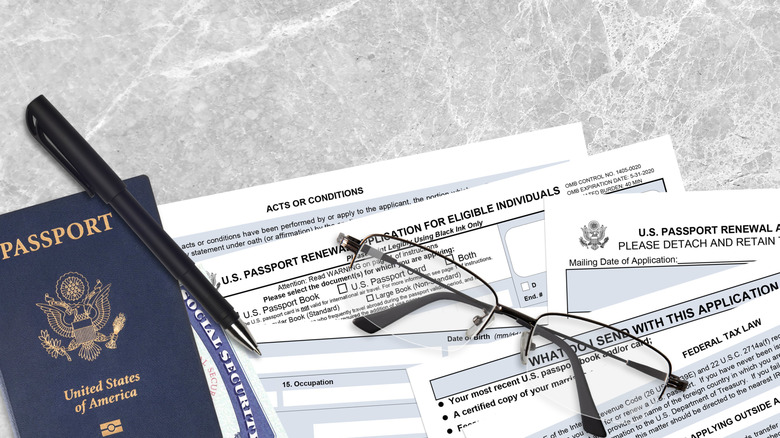Passport Laws Travelers Need To Know Before Planning A Destination Vacation
Ask many international travelers, and they will say one of their greatest fears is being arrested or detained abroad. Unfortunately, this nightmare can become a reality despite having a valid passport for travel if your passport expiration date is in the next few months. As each country sets its own entry requirements for foreign travelers, be sure to check how long your passport must be valid upon entry to your destination and transit countries, especially if it expires within the next year. Unlike visas or visa waivers that have a clear expiration date, passports can be invalid for travel to certain countries, despite being valid forms of identification and citizenship.
Travelers who have found themselves with invalid passports for travel have generally found little sympathy from both the airline and immigration officials at their destination country. At best, travelers who have been caught up at check-in have been denied boarding and out thousands of dollars to purchase last-minute tickets or had their dream vacations crushed, while the worst-case scenario could leave you in a heap of trouble.
Per Consumer Rescue, a woman who flew to Switzerland from the United States was arrested and refused entry due to her passport not having the required period of validity for her stay in the Schengen area, missing it by five days. Unfortunately, an agent for Swiss International Air Lines (SWISS) missed the detail that her passport was invalid for travel and allowed her to board the flight. Despite the agent letting her board, Section 13 of the airline's General Conditions of Carriage says the passenger has the sole responsibility of acquiring all necessary documentation before travel. Therefore, the woman was still on the hook for her trip costs. She also bore personal responsibility for her detention for traveling on an invalid document to Europe. Ultimately, SWISS can pass any fines resulting from a passenger's inadmissibility due to invalid documentation back to the passenger.
When should you renew your passport
Many countries, including some of the most underrated tourist destinations in the world, require travelers to have a valid passport for a minimum of six months after their entry date. This means that if you arrive on January 1, your passport must be valid until July 1 to be granted entry. Other countries, such as Japan, Canada, and the U.K. require passports to be valid for the total duration of your trip. Note that if you transit through one of these countries to the European Union and do not have a passport with at least six months of validity, you will likely find yourself stuck in transit or will be denied boarding. If you'll be visiting multiple countries, check the entry requirements for each one. Before you purchase tickets and hotels, double-check your passport's validity and your destination country's rules on the U.S. State Department's country travel information page.
A general rule of thumb and recommendation from the U.S. State Department is to renew your passport if it will expire within the next year. Taking steps to renew your passport earlier means you can renew your passport online or by mail without additional fees for expedited service. That said, it may take up to six weeks for a regular U.S. passport to be renewed, not including mailing. If you have upcoming international travel sooner, you can use the State Department's urgent passport service to get a passport quickly so you don't miss your trip.
Other passport problems to consider
Having an out-of-date passport is one key reason to renew your ticket to the world. However, it is not the only reason why you may be denied entry or denied boarding. Even though passports can suffer from regular wear and tear, it's not a good idea to fly with a damaged passport. This is especially true if your dog got a hold of it or if any of the internal pages or the cover are visibly damaged. Per the State Department, a damaged passport has water damage, a significant tear, unofficial markings on the data page, missing visa pages, or a hole punch.
Many countries officially require a minimum of one blank page for entry, with others require more. If your passport is starting to fill up with stamps and visa stickers, you should also check your passport for the number of blank pages to meet countries' entry requirements. Zambia and Botswana officially require three blank pages each, while South Africa requires two blank pages next to each other per entry. Of course, you'll need to add up pages for each country you plan to visit. For example, transiting through South Africa to a third country such as Zimbabwe requires six blank pages (two for Zimbabwe and two for South Africa each way).
Even if you do have a valid passport, make sure you are up to date with changing entry requirements for tourism and short-term stays. Canada, South Korea, and the U.K. have already begun to issue electronic travel authorizations, and blocs such as the EU are upgrading their entry/exit systems as well. As of January 2025, U.S. travelers are currently exempt from applying for a Canadian eTA or Korean K-eTA for tourism purposes, but are required to have an eTA for short visits to the U.K. All of these require a biometric passport to apply, though all U.S. passports issued since 2007 meet the requirement.


